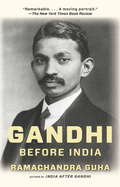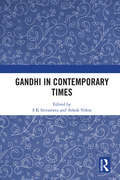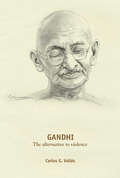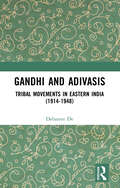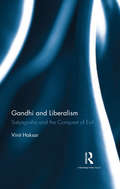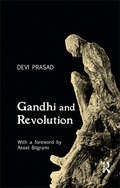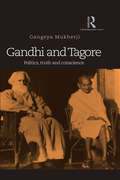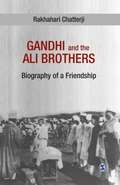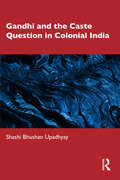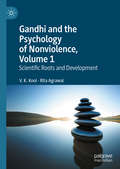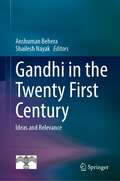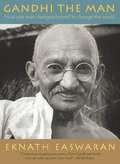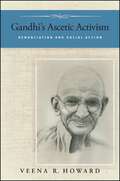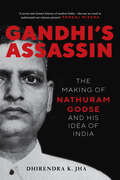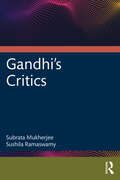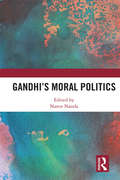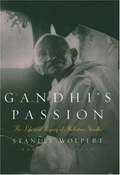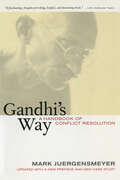- Table View
- List View
Gandhi Before India
by Ramachandra GuhaThe first volume of a magisterial biography: the definitive portrait of the life and work of one of the most abidingly influential--and controversial--men in modern history. Here is a revelatory work of biography that takes us from Gandhi's birth in 1869 through his upbringing in Gujarat, his 2 years as a student in London, and his 2 decades as a lawyer and community organizer in South Africa. Ramachandra Guha has uncovered a myriad of previously untapped documents, including: private papers of Gandhi's contemporaries and co-workers; contemporary newspapers and court documents; the writings of Gandhi's children; secret files kept by British Empire functionaries. Using this wealth of material in a brilliantly nuanced narrative, Guha describes the social, political and personal worlds in which Gandhi began his journey to become the modern era's most important and influential political actor. And Guha makes clear that Gandhi's work in South Africa--far from being a mere prelude to his accomplishments in India--was profoundly influential on his evolution as a political thinker, social reformer and beloved leader.
Gandhi Faces The Storm
by Gene SharpThis is the story of the inner Gandhi from 1946 to his death. It is the story of his wrestling and searching, anguish and faith, his determination and courage. No one can understand Gandhi if he does not know what Gandhi went through during those two years. No one can evaluate his work unless he knows Gandhi’s own evaluation. In this small volume I have tried to carry across to the reader the main trends in Gandhi’s thinking and his final conclusions, being as true to the spirit as I could. Whenever possible, I have allowed Gandhi to speak for himself. Gandhi Faces the Storm is intended for those who already have some knowledge of Gandhi and who wish to learn more. May this not be simply another book about Gandhi which will be read merely for curiosity. May the reader examine Gandhi’s message in his heart.
Gandhi For The New Generation
by Gunvant ShahI believe that by giving such meaningful lectures he (Shri Gunvant Shah) has done some real good service to the people… Such literature is necessary to guide the new generation to follow the proper path. …His presentation based on facts and incidents is really admirable. His style would attract the new generation since one finds in his presentation a happy blend of logic and reflective thinking. — Morarji Desai
Gandhi In Contemporary Times
by S K Srivastava Ashok VohraThis volume brings together essays which discuss and contextualise Gandhi’s ideas on pluralism, religious identity, non-violence, satyagraha, and modernity. It interrogates the epistemic foundations of Gandhian thinking and weltanschauung, identifies diverse strands within his arguments, and gives it new meaning in contemporary society. This book focuses on Gandhi’s engagements with religious, political and social conflicts, his reflections on faith and modernity, and his argumentative dialogues with Mohammad Ali Jinnah and B R Ambedkar. It provides critical insights into Gandhi’s philosophy and suggests ways of engaging with his ethical and moral ideas in contemporary intellectual and political discourse. Comparing and contrasting Gandhian thought and strategies with contemporary issues and conceptions of religious freedom, conflict resolution, and liberalism; the volume reformulates and reconstitutes his intellectual and political legacy. This book points to new and possible future directions of research on Gandhian concepts and will be useful for scholars in the fields of political science, Gandhian studies, sociology and philosophy.
Gandhi Parv: गांधी पर्व
by T. V. Parvateमहाराष्ट्राच्या आणि भारताच्या स्वातंत्र्याच्या लढ्यात राष्ट्रपिता महात्मा गांधी यांनी एक नवीन पर्व सुरु केले. १ ऑगस्ट, १९२० ला लोकमान्य टिळकांचे निधन झाल्यानंतर स्वातंत्र्याच्या चळवळीची धुरा महात्मा गांधीजींच्या खांद्यावर आली आणि ३० जानेवारी, १९४८ ला त्यांची हत्त्या होईपर्यंत ते राष्ट्राचे एकमेव असे नेते राहिले. त्यांच्या हयातीतच सामुदायिक असहकाराची चळवळ, मिठाचा सत्याग्रह, भारत छोडो इत्यादी चळवळी झाल्या. आणि शेवटी त्यातून भारताला स्वातंत्र्य मिळाले. महात्मा गांधीनी केवळ राजकीय चळवळी केल्या नाहीत तर सामाजिक चळवळीही फार मोठ्या प्रमाणात करण्याचे श्रेय त्यांचे आहे. चरखा संघ, ग्रामोद्योग संघटना, कुष्ठरोग निवारणाची चळवळ इत्यादी अनेक विधायक चळवळी पण त्यांनी सुरु केल्या.
Gandhi The Alternative To Violence
by Carlos G. VallésGandhi The alternative to violence Gandhi achieved, for the first time in history, the independence of a great country from a great empire without waging a war of independence. Up to his day, colonies in America and Asia had won independence from the colonizing powers in Europe, but never without a war. Even in India, some political and military leaders like Nehru, Patel and Subash Chandra Bose thought an armed uprising would be necessary and a war would have to be waged to free India from Britain. But Gandhi prevailed, and won. He achieved independence through peaceful means. That was a landmark in history. After him and through his example, many more countries in Asia and Africa did gradually become independent without a war, and this is precisely Gandhi's vital contribution to the history of the human race. Freedom without war.
Gandhi and Adivasis: Tribal Movements in Eastern India (1914-1948)
by Debasree DeAdivasi movements played a very important, if not determining, role in the India’s freedom struggle. Gandhi’s idea of mass mobilization couldn’t have been successful without the active participation of all sections of the Indian society. Adivasi movements were swelled by Gandhian ideology only during the Non-Cooperation movement. Though Gandhi’s interest in the tribal problems crystallized at a later stage of his life, his influence on tribal movements was revealing. His association with Thakkar Bapa and Verrier Elwin also enriched his knowledge about tribal state of affairs. Adivasis started looking at Gandhi as saviour or a saint, who could deliver them justice and peace. But, Gandhi always supported Adivasi movements in order to give a mass character to his movements. There were some particular demands of the Adivasis that were not supported by Gandhi. Their armed struggle was also against his non-violent principles. During the latter half of the twentieth century, movements like Tana Bhagat and Hari Baba were purely influenced by the Gandhian ideology, but failed to achieve their goals. Later on, the Jharkhand movement adopted the character of a non-violent struggle; here also the fruits disappeared. The present work focuses on the first three movements of the Chota Nagpur Plateau of eastern India during Gandhi’s lifetime and the current movements against forceful displacement by POSCO, Vedanta and others, in order to comprehend his ideological impact on Adivasi movements of today. The book has critically analysed and evaluated Gandhi’s impact on the Adivasi situation in colonial and post-colonial India. Please note: Taylor & Francis does not sell or distribute print edition in India, Pakistan, Nepal, Bhutan, Bangladesh and Sri Lanka.
Gandhi and Liberalism: Satyagraha and the Conquest of Evil
by Vinit HaksarOne of the main themes running through Gandhi’s life and work was the battle against evil. This book offers a fascinating reconstruction of Gandhi and the doctrine of Ahimsa or non-violence. Gandhi’s moral perfectionism is contrasted with other forms of perfectionism, but the book stresses that Gandhi also offered a doctrine of the second best. Following Gandhi, the author argues that outward violence with compassion is intrinsically not as good as non-violence with compassion, but it is a second best that is sometimes a necessary evil in an imperfect world. The book provides an illuminating analysis of coercion, non-co-operation, civil disobedience and necessary evil, comparing Gandhi’s ideas with that of some of the leading western moral, legal and political philosophers. Further, some of his important ideas are shown to have relevance for the working of the Indian Constitution. This book will be essential for scholars and researchers in moral, legal and political philosophy, Gandhi studies, political science and South Asian studies.
Gandhi and Revolution
by Devi PrasadThis volume is a collection of Devi Prasad’s essays on Gandhi, social justice and social change. The different essays address themes ranging from Gandhi’s ideals of satyagraha and ahimsa, civil disobedience and non-violence, to the Gandhian approach to education as founded in making and crafting as well as participation in the political and social movements of our times. They also engage the revolutionary potential of Gandhi’s thought, drawing parallels between Lenin and Gandhi and analysing the historical significance of Gandhi’s anti-imperialist yet non-violent political philosophy. In sum, the volume dwells on the continuing, critical relevance of Gandhi in our times. It will be of interest to those in education, political science, peace and conflict studies, history and philosophy, as well as to the general reader interested in Gandhian thought.
Gandhi and Tagore: Politics, truth and conscience
by Gangeya MukherjiThis book brings together the political thought of Gandhi and Tagore to examine the relationship between politics, truth and conscience. It explores truth and conscience as viable public virtues with regard to two exemplars of ethical politics, addressing in turn the concerns of an evolving modern Indian political community. <P><P>The comprehensive and textually argued discussion frames the subject of the validity of ethical politics in inhospitable contexts such as the fanatically despotic state and energised nationalism. The book studies in nuanced detail Tagore’s opposition to political violence in colonial Bengal, the scope of non-violence and satyagraha as recommended by Gandhi to Jews in Nazi Germany, his response to the complexity of protest against the Jallianwala Bagh massacre, and the differently constituted nationalism of Gandhi and Tagore. It presents their famous debate in a new light, embedded within the dynamics of cultural identification, political praxis and the capacity of a community to imbibe the principles of ethical politics. Comprehensive and perceptive in analysis, this book will be a valuable addition for scholars and researchers of political science with specialisation in Indian political thought, philosophy and history. <P><P>Gangeya Mukherji is Reader in English at Mahamati Prannath Mahavidyalaya, Mau-Chitrakoot, Uttar Pradesh, India.
Gandhi and the Ali Brothers
by Rakhahari ChatterjiThe campaign of the Khilafat Movement and the Ali brothers' close collaboration with Gandhi are well acknowledged in the pages of history. It is also well known that after the collapse of the Khilafat-Non-cooperation Movement, the relationship between them became strenuous, and the Ali brothers moved away from Gandhi. But what is not so well known is that the promise of the relationship when it was forged was astounding, and Gandhi saw it as a solution to the problem of Hindu-Muslim unity, which he considered fundamental to India's independence. This book is a study of the relationship between Gandhi and the Ali brothers mainly in the context of the Non-cooperation and Khilafat Movements, focusing on the period of 1919-1931. Gandhi's involvement in the Khilafat agitation was his first direct intervention in an exclusively Muslim question, translating it into a national question. This was his way of bringing the Muslims out of their community cocoons into the mainstream of India's national politics. However, as his relationship with the brothers broke down, this turned out to be also his last such intervention. Consequently, the issue of Muslim participation remained unsettled till Partition. Gandhi and the Ali Brothers narrates the story of the coming together, the joint struggle and the parting of ways of Gandhi and the Ali brothers. It documents a lucid micro-history of the momentous developments in the personal relations of these political figures, with the dynamics of Hindu-Muslim interface as the backdrop.
Gandhi and the Caste Question in Colonial India
by Shashi Bhushan UpadhyayThis book comprehensively surveys and critically analyses Gandhi’s ideas on caste and untouchability. It emphasizes the fact that Gandhi was a considerable thinker who had seminal ideas on the caste question. As an intellectual history, this book is not just a study of his ideas but also of what he practised. It narrates his lifelong struggle against untouchability since his South African days and focuses on his distinctive understanding of the caste question which differed sharply from that of his contemporaries both on the right and the left.The book also critically analyses and questions the attribution of strategy to Gandhi with regard to both the nationalist and anti-untouchability movements. The volume will be of great interest to scholars and researchers of history, caste and discrimination studies, and South Asian studies.
Gandhi and the Psychology of Nonviolence, Volume 1: Scientific Roots and Development
by Rita Agrawal V. K. KoolThe first of two volumes, this book examines Gandhi’s contribution to an understanding of the scientific and evolutionary basis of the psychology of nonviolence, through the lens of contemporary researches on human cognition, empathy, morality and self-control.While, psychological science has focused on those participants that delivered electric shocks in Professor Stanley Milgram’s famous experiments, these books begin from the premise that we have neglected to fully explore why the other participants walked away. Building on emergent research in the psychology of self control and wisdom, the authors illustrate what Gandhi’s life and work offers to our understanding of these subjects who disobeyed and defied Milgram.The authors analyze Gandhi’s actions and philosophy, as well as original interviews with his contemporaries, to elaborate a modern scientific psychology of nonviolence from the principles he enunciated and which were followed so successfully in his Satyagrahas. Gandhi, they argue, was a practical psychologist from whom we can derive a science of nonviolence which, as Volume 2 will illustrate, can be applied to almost every subfield of psychology, but particularly to those addressing the most urgent issues of the 21st century. This book is the result of four decades of collaborative work between the authors. It marks a unique contribution to studies of both Gandhi and the current trends in psychological research that will appeal in particular to scholars of social change, peace studies and peace psychology, and, serve as an exemplar in teaching one of modern psychology’s hitherto neglected perspectives.
Gandhi for Kids: His Life and Ideas, with 21 Activities
by Ellen MahoneyConnecting Gandhi's ideas and his life's work to contemporary issues this useful resource for parents and teachers makes Gandhi relevant for kids today. Packed with historic images, the book includes informative sidebars; a time line, glossary, and resource section, along with 21 activities that illuminate Gandhi's life, environment, and ideas.
Gandhi in the Twenty First Century: Ideas and Relevance
by Shailesh Nayak Anshuman BeheraThis book engages a multidisciplinary approach to understand Gandhi in addressing specific contemporary societal issues. The issues highlighted in the book through thirteen distinct, yet interrelated, themes offer solutions to the societal challenges through the prism of Gandhian thought process. This edited book explores how ideas Gandhi expressed over a century ago can be applied today to issues from the UN's Sustainable Development Goals to peaceful resolution of conflicts. In particular, it looks at the contemporary societies' critical issues and offers solutions through the prism of Gandhian ideas. Written in an accessible style, this book reintroduces Gandhi to today's audiences in relevant terms.
Gandhi the Man
by Eknath EaswaranThis is the moving story of a nonviolent hero, illustrated with more than 70 photographs, and told by a highly respected author who grew up in Gandhi's India.Gandhi's life continues to inspire and baffle readers today. How did an unsuccessful young lawyer become the Mahatma, the "great soul" who led 400 million Indians in their struggle for independence from the British Empire? What is nonviolence, and how does it work?Easwaran answers these questions and gives a vivid account of the turning points and choices in Gandhi's life that made him an icon of nonviolence. Easwaran witnessed at firsthand how Gandhi inspired ordinary people to turn fear into fearlessness, and anger into love. He visited Gandhi in his ashram to find out more about this human alchemy, and during the prayer meeting watched the Mahatma absorbed in meditation on the Bhagavad Gita, the scripture that was the wellspring of his spiritual power.Quotations highlight Gandhi's teachings in his own words, and sidebar notes and a chronology, new to this updated edition, provide historical context.This book conveys the spirit and soul of Gandhi - the only way he can be truly understood.
Gandhi's Ascetic Activism: Renunciation and Social Action
by Veena R. HowardMore than six decades after his death, Mohandas Gandhi continues to inspire those who seek political and social liberation through nonviolent means. Uniquely, Gandhi placed celibacy and other renunciatory disciplines at the center of his nonviolent political strategy, conducting original experiments with their possibilities to gain practical, moral, and even miraculous powers for social change. Gandhi's abstinence in marriage, eccentric views on sexuality, and odd ways of including his female associates in his practices continue to cause ambivalence among scholars and students. Through a comprehensive study of Gandhi's own words, select Indian religious texts and myths that he used, and the historical and cultural context of his activism, Veena R. Howard shows how Gandhi's ascetic disciplines helped him mobilize millions. She explores Gandhi's creative use of renunciation in challenging established paradigms of confrontational politics, passive asceticism, and oppressive social customs. Howard's book sheds new light on the creative possibilities Gandhi discovered in combining personal renunciation, sacrifice, ritual, and myth for modern day social action.
Gandhi's Assassin: The Making of Nathuram Godse and His Idea of India
by DHIRENDRA JHAThe life of Nathuram Godse, the man who shot GandhiDhirendra Jha's deeply researched history places Nathuram Godse's life as the juncture of the dangerous fault lines in contemporary India: the quest for independence and the rise of Hindu nationalism.On a wintry Delhi evening on 30 January 1948, Nathuram Godse shot Gandhi at point-blank range, forever silencing the man who had delivered independence to his nation. Godse&’s journey to this moment of international notoriety from small towns in western India is, by turns, both riveting and wrenching. Drawing from previously unpublished archival material, Jha challenges the standard account of Gandhi&’s assassination, and offers a stunning view on the making of independent India.Born to Brahmin parents, Godse started off as a child mystic. However, success eluded him. The caste system placed him at the top of society but the turbulent times meant that he soon became a disaffected youth, desperately seeking a position in the infant nation.In such confusing times, Godse was one of hundreds, and later thousands, of young Indian men to be steered into the sheltering fold of early Hindutva, Indian nationalism. His association with early formations of the RSS and far-right thinkers such as Sarvakar proves that he was not working alone. Today he is considered to be a patriotic hero by many for his act of bravery, despite being found guilty in court and executed in 1949.
Gandhi's Critics
by Subrata Mukherjee Sushila RamaswamyThe book is a definitive account of Gandhi’s major critics. It presents a detailed and comprehensive account of each critic, assesses their criticisms of Gandhi and underlines the significance and achievements of Gandhi against the backdrop of the critiques – from contemporaries like the Nehrus (Motilal and Jawaharlal), Tagore, Churchill, Jinnah, Periyar, Savarkar, Ambedkar, Subhas Bose, the Marxists (from the mid-1920s until 1947 and post-independence), P.C. Ray, Visvesvaraya and Saha, to later critics like Orwell, Alinsky, Mandela, King and critics from Africa.The volume will be of immense importance to scholars and students of undergraduate and postgraduate courses in political science and South Asian studies. It will also be of interest to general readers interested in history and politics.
Gandhi's Khadi: A History of Contention and Conciliation
by Rahall RamagundamMahatma Gandhi changed Khadi fabric to a political symbol during India's struggle for Independence from the colonial British regime. Today most of the independent politicians in India wear Khadi.
Gandhi's Life In His Own Words
by Krishna KripalaniMy uniform experience has convinced me that there is no other God than Truth. And if every page of these chapters does not proclaim to the reader that the only means for the realization of Truth is ahimsa, I shall deem all my labour in writing these chapters to have been in vain. And, even though my efforts in this behalf may prove fruitless, let the readers know that the vehicle, not the great principle, is at fault.— M. K. Gandhi
Gandhi's Moral Politics
by Naren NandaThis volume explores the scope and limits of Mahatma Gandhi's moral politics and its implications for Indian and other freedom movements. It presents a set of enlightening essays based on lectures delivered in memory of the eminent historian B. R. Nanda along with a new introductory essay. With contributions by leading historians and Gandhi scholars, the book provides new perspectives on the limits of Gandhi’s moral reasoning, his role in the choice of destination by Indian Muslim refugees, his waning influence over political events, and his predicament amid the violence and turmoil in the years immediately preceding partition. The work brings together wide-ranging insights on Gandhi and revisits his religious views, which were the foundation of his morality in politics; his experience of civil disobedience and its nature, deployment and limits; Satyagraha and non-violence; and his struggle for civil rights. The volume also examines how Gandhi’s South African phase contributed to his later ideas on private property and self-sacrifice. This book will be of immense interest to researchers and scholars of modern Indian history, Gandhi studies, political science, peace and conflict studies, South Asian studies; to researchers and scholars of media and journalism; and to the informed general reader.
Gandhi's Passion: The Life and Legacy of Mahatma Gandhi
by Stanley WolpertMahatma Gandhi, through his indomitable will and selfless determination, transformed himself into a model of courage and integrity for India's people to emulate in their nonviolent struggle for political power. More than half a century after his death, Gandhi continues to inspire millions throughout the world. Yet modern India seems to have abandoned much of his nonviolent vision, joining the nuclear arms race. Inspired by recent events in India, Stanley Wolpert offers this subtle and profound biography of India's "Great Soul". Wolpert compellingly chronicles the life of Mahatma Gandhi from his early days as a child of privilege to his humble rise to power and his assassination at the hands of a man of his own faith. This trajectory, like that of Christ, was the result of Gandhi's passion: his conscious courting of suffering as the means of reaching divine truth. From his early campaigns to end discrimination in South Africa to his leadership of a people's revolution to end the British imperial domination of India, Gandhi emerges as a man of inner conflicts conquered by his political genius and moral vision. The sweet reasonableness of his "Great Soul", combined with the steel of his unyielding opposition to intolerance and oppression, would inspire India like no leader since the Buddha -- creating a legacy that would encourage Martin Luther King, Jr., Nelson Mandela, and other global leaders to demand a better world through peaceful civil disobedience.
Gandhi's Printing Press
by Isabel HofmeyrAt the same time that Gandhi, as a young lawyer in South Africa, began fashioning the tenets of his political philosophy, he was absorbed by a seemingly unrelated enterprise: creating a newspaper. Gandhiâe(tm)s Printing Press is an account of how this project, an apparent footnote to a titanic career, shaped the man who would become the world-changing Mahatma. Pioneering publisher, experimental editor, ethical anthologistâe"these roles reveal a Gandhi developing the qualities and talents that would later define him. Isabel Hofmeyr presents a detailed study of Gandhiâe(tm)s work in South Africa (1893âe"1914), when he was the some-time proprietor of a printing press and launched the periodical Indian Opinion. The skills Gandhi honed as a newspapermanâe"distilling stories from numerous sources, circumventing shortages of typeâe"influenced his spare prose style. Operating out of the colonized Indian Ocean world, Gandhi saw firsthand how a global empire depended on the rapid transmission of information over vast distances. He sensed that communication in an industrialized age was becoming calibrated to technological tempos. But he responded by slowing the pace, experimenting with modes of reading and writing focused on bodily, not mechanical, rhythms. Favoring the use of hand-operated presses, he produced a newspaper to contemplate rather than scan, one more likely to excerpt Thoreau than feature easily glossed headlines. Gandhiâe(tm)s Printing Press illuminates how the concentration and self-discipline inculcated by slow reading, imbuing the self with knowledge and ethical values, evolved into satyagraha, truth-force, the cornerstone of Gandhiâe(tm)s revolutionary idea of nonviolent resistance.
Gandhi's Way: A Handbook of Conflict Resolution
by Mark JuergensmeyerGandhi’s Way provides a primer of Mahatma Gandhi’s principles of moral action and conflict resolution and offers a straightforward, step-by-step approach that can be used in any conflict—-at home or in business; in local, national, or international arenas. This invaluable handbook, updated with a new preface and a new case study on terrorism in Northern Ireland, sets out Gandhi’s basic methods and illustrates them with practical examples. Juergensmeyer shows how parties at odds can rise above a narrow view of self-interest to find resolutions that are satisfying and beneficial to all involved. He then pits Gandhi’s ideas against those of other great social thinkers in a series of imaginary debates that challenge and clarify Gandhi’s thinking on issues of violence, anger, and love. He also provides a Gandhian critique of Gandhi himself and offers viable solutions to some of the gaps in Gandhian theory. Gandhi’s Way: A Handbook of Conflict Resolution was previously published as Fighting with Gandhi and Fighting Fair.
